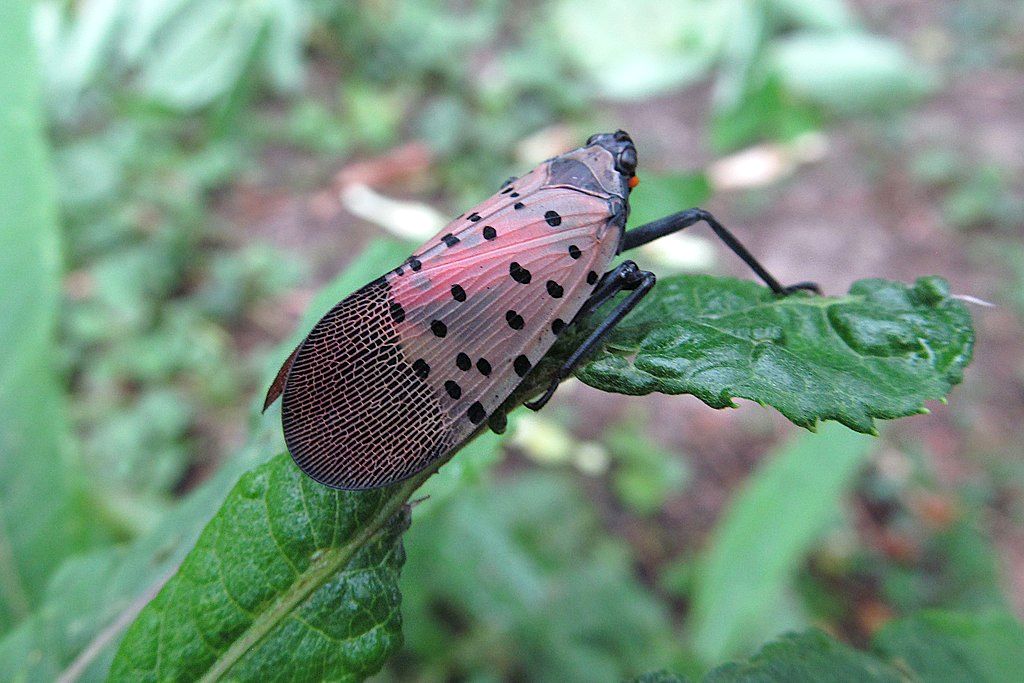PROTECT YOUR DNA WITH QUANTUM TECHNOLOGY
Orgo-Life the new way to the future Advertising by Adpathway Spotted lanternfly in Pittsburgh, 23 July 2022 (photo by CBailey via Wikimedia Commons)
Spotted lanternfly in Pittsburgh, 23 July 2022 (photo by CBailey via Wikimedia Commons)5 September 2025
Right now adult spotted lanternflies are flying to find each other and their host plant, Ailanthus, to mate, lay eggs and die. In Pittsburgh we had a major invasion in 2023 from mid August to mid September but they’re not so bad this year, as expected based on their initial North American invasion in Eastern Pennsylvania. There is more to learn from that initial invasion including lists of their top bird and insect predators.
#1 Bird: Chickens! Backyard chickens eat a lot more than grain and are known to gobble up spotted lanternfly nymphs when they find them. The nymph phase ran from June to late July in Pittsburgh this year.
 Chickens foraging (photo from Wikimedia Commons)
Chickens foraging (photo from Wikimedia Commons)Wild Birds: Plenty of birds have figured out that spotted lanternflies are good to eat including visiting warblers. The top predators, however, are resident birds and one migratory species that leaves for the winter, shown in the slideshow below. All of them catch both nymphs and adults: Northern cardinals, gray catbirds, blue jays and tufted titmice.
Birds that are Top Predators of Spotted Lanternflies in Pennsylvania according to PSU study
Top Insects: In March 2025 Penn State Agricultural Sciences published a study on predatory insects that eat spotted lanternflies. They found a new-to-me top predator, the spined soldier bug.
We then tested 10 commercially available or easily field-collected generalist predators to determine if these potential biological control agents could reduce L. delicatula populations. Spined soldier bugs (Podisus maculiventris), Carolina mantids (Stagmomantis carolina), and Chinese mantids (Tenodera sinensis) were the most effective at reducing prey populations, indicating they have promise as effective natural control agents.
— Springer Nature Link: Predation of spotted lanternfly (Lycorma delicatula) by generalist arthropod predators in North AmericaSpined soldier bugs (Podisus maculiventris) are native insects that resemble brown marmorated stink bugs from Asia, except that these eat insects not plants. They’re called soldiers because they gather in groups to attack and kill their prey. Awesome!
Here’s an adult. Notice the resemblance to the stink bug.
 Adult spined soldier bug, native to U.S. (photo from Wikimedia Commons)
Adult spined soldier bug, native to U.S. (photo from Wikimedia Commons)And here’s a nymph eating a caterpillar.
 Nymph spined soldier bug eating a caterpillar (photo from Wikimedia Commons)
Nymph spined soldier bug eating a caterpillar (photo from Wikimedia Commons)The next most effective insect predator of spotted lanternflies is the Chinese praying mantis (Tenodera sinensis) which naturally recognizes their fellow Asian insect food.
 Chinese praying mantis in PA (photo from Wikimedia Commons)
Chinese praying mantis in PA (photo from Wikimedia Commons)Read more about insect predators at Penn State’s Natural insect predators may serve as allies in spotted lanternfly battle.
The Cleveland area may find this news quite useful as they are swamped with spotted lanternflies this month.























 English (US) ·
English (US) ·  French (CA) ·
French (CA) ·